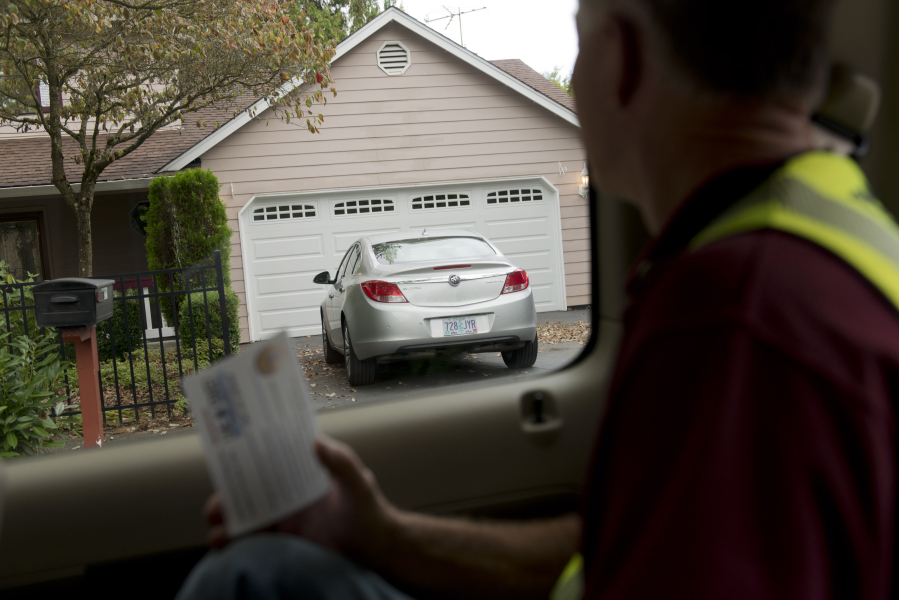Drivers beware: If you’re a Vancouver resident with out-of-state plates, the city is on the prowl.
The first wave of volunteers from the Neighbors On Watch group patrolled Vancouver neighborhoods last weekend on the lookout for out-of-state vehicles parked in residential neighborhoods. License plates were recorded and vehicles that could be out of compliance received an informational pamphlet on the law.
Some 10 percent of Vancouver residents have failed to register their vehicles in Washington state, and it’s costing the city more than $300,000 annually in Transportation Benefit District funding.
The funding — about $2.4 million annually — is generated by the district and a $20 license tab renewal fee that was implemented in 2016. Those fees are used to improve city streets, including fixing potholes and sidewalks.
The city’s $300,000 loss could double in mid-2018 if the city council, acting as the Transportation Benefit District Board, approves a recommended license tab fee increase to $40. That decision will be made in December.
Volunteer patrol
When the city council learned of the issue in June, councilors agreed action was needed. Thus the volunteer patrol program was born.
Jaycee Elliott, Vancouver police crime analyst, said that’s just the first step in the plan. While volunteers patrol neighborhoods, the team will record license plates into a database and return to those neighborhoods 30 to 45 days later to check compliance.
“The hard thing with regulating compliance is just because we observe a vehicle in residential areas with out-of-state plates doesn’t mean we can prove they’re out of compliance,” Elliott said. “The definition of what a resident is with regard to vehicle registration is very clear, but very difficult to measure.”
Washington residents are required to register their vehicles within 30 days of moving to the state or face a $529 penalty.
“If we observe the vehicle twice, we can be more confident they’re not compliant,” he said.
If cars are observed a second time by volunteers, the team will try to pair an owner with the vehicle and send a letter informing the owner of required vehicle registration compliance.
Vancouver police will also work with the city to encourage voluntary compliance. Elliott said officers will receive specialty training in vehicle registration compliance and what steps to take for enforcement. Officers will identify violators in traffic stops.
“They’re not going to be stopping people that have Oregon plates or out-of-state plates, but when they’re conducting normal business with out-of-state drivers, they may be asking questions like, ‘Do you live in Vancouver?’ ” he said. “They can verify that information from the license of the driver.”
Citations are not yet on deck because the city wants to see how much progress it can make with voluntary compliance first.
“We may want to do some more enforcement later on down the line, but we really want to see what some voluntary compliance efforts can do first,” Elliott said.
The final layer to reining in vehicle registration avoidance is a new reporting system.
Elliott said neighbors can go online and report vehicles they’ve observed exceeding the 30-day grace period and avoiding registration.
“At an individual level, I can’t imagine that registered vehicle owners are not registering because they don’t want to pay a $20 tab fee,” he said. “It’s more likely to avoid taxes. But what specifically impacts the city is that tab fee.”




